The American administration's peace plan has been hanging over the Middle East like a cloud for many months.
It was recently reported that the initiative would be unveiled in June, after the Muslim holy month of Ramadan. Now, however, it appears we are headed for another delay. US President Donald Trump's special envoy to the region, Jason Greenblatt, said on Monday that the administration could wait until after the upcoming general election in Israel, scheduled for September 17.
Follow Israel Hayom on Facebook and Twitter
"We still haven't made a decision whether to delay the release of the plan until after the election," Greenblatt said at the 8th annual Jerusalem Post conference in New York. "We will decide after [the] Bahrain [economic summit]; right now we are focused on the summit there."
Greenblatt specified November 6 as a possible date for the plan's rollout, perhaps in the thought that after the election it will take some time to form a coalition, certainly in part because it will be holiday season in Israel.
"The second Israeli election threw us off course," Greenblatt admitted, but added it was "lucky there's a democracy in Israel."
While Greenblatt argued that the Palestinian public largely supports the American peace plan, he unflinchingly endorsed one idea that certainly wouldn't be welcomed by the Palestinian street.
Asked if he agrees with US Ambassador to Israel David Friedman's comments last week that Israel has the right to annex parts of the West Bank, Greenblatt said: "I support his comment. I will let David's comment stand for itself."
Greenblatt hailed the fact that none of the plan's details have been leaked thus far, calling the work involved in drafting the initiative an "extraordinary" undertaking.
"We hold something very delicate in our hands. If we keep a tight lid on it, we increase chances of success," he explained.
The US envoy lambasted senior Palestinian Authority officials, who he accused of misrepresenting the administration's intentions.
"Saeb Erekat and others are distorting our message. They're saying essentially that the Bahrain conference is about buying the Palestinians off. Absolutely not true," he said.
"The Bahrain summit is aimed to show what could happen to the Palestinian economy if there's a peace agreement. We understand completely that there is no economic vision that'll work without a peace agreement. But we also want to make the point that there will be no peace agreement that works without true economic vision. We're trying to break the cycle of aid and dependency and create an economy. They work hand in hand."




